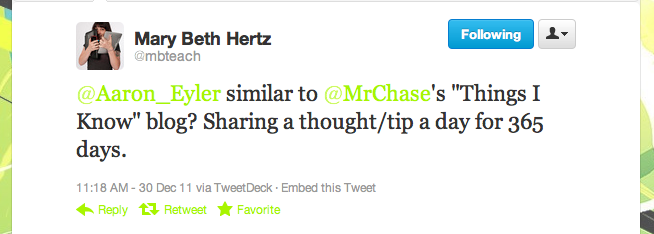This was the status that caught my eye:

An email showed up to tell me I’d been mentioned. (I want this service in real life.)
I in Central Illinois clicked through to see what Aaron in New Jersey said to start the conversation.
I jumped in to suggest some possible widgets or sidebar options for Aaron’s plan for 365 days of documented fitness training. He mentioned considering signing up for a marathon and triathalon to have specific goals and be able to compare results. Mary Beth in Philadelphia hopped back in to suggest we both try running a few miles and then heading to a yoga class. Aaron liked the idea, and then Heather from northwestern Illinois chimed in to second the running+yoga idea.
As all this was going on, Pete in New York tweeted some suggestions for embeddable apps for tracking training. I followed up with a suggestion for running the D.C. marathon in March and the Chicago marathon in October. We discussed it a bit more and I had to head out for lunch.
The whole conversation happened publically across 4 states and included hyperlinks for reference.
The cherry?
Hours later, when I opened Words with Friends on my phone, I had a chat message in one of my games. Michael in Colorado had seen the twitter conversation and said he was up for a shared workout plan.
Every once in a while, I’ll see a tweet or facebook update from someone asking for examples of social networking in the classroom. Those are fine. I’ve had many of them myself. What happened this morning, though, across the span of a few minutes, was an example of social networking in real life. In a conversation of 6 people, I’d met three of them face-to-face, but each had something positive to contribute to the conversation.